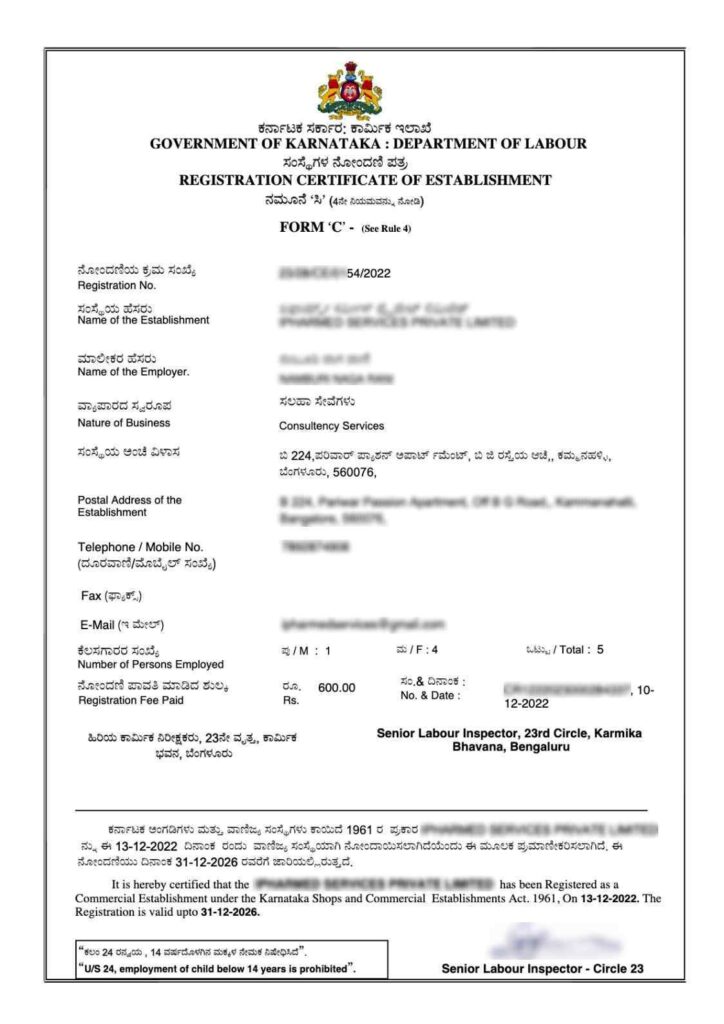
Shop and Establishment Act Registration
- Legal Recognition
- Employee Rights Protection
- Access to Government Schemes
- Consumer Confidence
- Employment Compliance
- Employment Compliance
- Simplified Legal Processes
Book My
Table of Content
- Shop and Establishment Act Registration - An Overview:
- Step-by-Step Process for Shop and Establishment Act Registration
- Renewal Applicability of Shop and Establishment Registration
- Documents Required for Shop and Establishment Act Registration:
- Shop and Establishment Registration

Shop and Establishment Act Registration - An Overview:
The Shop Registration Certificate acts as a valid proof of your business’s legal standing and is often required when applying for other licenses or permits. Whether you are opening a retail store, a service business, or any form of establishment, this registration is crucial for ensuring compliance with Indian law.

Step-by-Step Process for Shop and Establishment Act Registration
Public limited companies are broadly categorised into two distinct types:
- Proof of identity of the owner.
- Business address proof (e.g., lease agreement, utility bill).
- Employee details and photographs.
- Business ownership proof and nature of business.
- Depending on your location, either visit the local municipal authority or access the state-specific online portal for Shop and Establishment registration.
- Business name and address.
- Nature of business activity.
- Number of employees.
- Ownership details.
- Upload or submit scanned copies of all required documents as per the guidelines of the concerned authority.
- Pay the required registration fee (varies by state and type of business) either online or offline.
- In some cases, a local authority official may visit your premises for inspection to verify the provided details.
7. Receive Registration Certificate:
- After approval, you will receive the Shop and Establishment Registration Certificate, either digitally or by post
Renewal Applicability of Shop and Establishment Registration
The Shop and Establishment Act Registration typically requires renewal at regular intervals, though the renewal process and applicability can vary depending on the state or local municipal authority. Here’s an overview:
Documents Required for Shop and Establishment Act Registration:
- Proof of Identity of Owner :Aadhaar, PAN, or Passport.
- Business Address Proof:Lease/rental agreement or property ownership documents, plus utility bills.
- Photographs: Passport-sized photo of the owner or authorized person.
- Business Ownership Proof: Partnership deed, company incorporation certificate, or society registration (if applicable).
- Employee Details: List of employees with positions and working hours.
- Nature of Business: Description of business activities.
- Bank Account Details: Business bank account details.
- GST Registration Number: If applicable.
- Incorporation Documents: MOA, AOA, or incorporation certificate for companies.
FAQs for Shop and Establishment Registration
The Shop and Establishment Act is a state-specific law that regulates the working conditions, hours of operation, and rights of employees in shops and commercial establishments.
Any business (shop, office, restaurant, etc.) employing one or more people is required to register under the Act.
Yes, it is mandatory for businesses to obtain this registration to legally operate within the jurisdiction of the local municipal authority.
Businesses like retail shops, offices, restaurants, service providers (e.g., salons, consultancies), and wholesalers need registration.
Documents like identity proof of the owner, business address proof, employee details, and ownership proof are required.
• Ability to raise capital from the public.
• Limited liability for shareholders.
• Enhanced public profile and reputation.
• Greater opportunities for expansion and growth.
• Share transferability.
You can apply either online through the state government portal or offline by visiting the local municipal office.
Yes, there is a registration fee, which varies by state and business type.
Yes, it requires periodic renewal, usually annually or every 3-5 years, depending on your state's regulations.
Non-registration can lead to penalties, legal issues, or closure of your business.
Yes, many states offer online registration facilities through their respective portals.
Yes, if you employ workers in a home-based business, it must be registered under the Act.
No, government offices and public sector organizations are generally exempt from this registration.
Yes, if ownership changes, the new owner can apply for a transfer or update of the registration.
Yes, the registration is valid for a specific period (usually one year to five years), after which it needs to be renewed.
An IPO is the process by which a private company offers its shares to the public for the first time, allowing it to become a PLC. This is typically done to raise capital for expansion or to pay off debt.
Related Business Registrations
In addition to registration or incorporation, a business may require other registrations depending on the business activity undertaken. Talk to an Advisor to find out registrations your business may require post registration.







